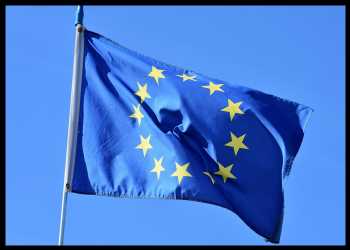ECB Signals Pause After Hiking Rates For Tenth Session

The European Central Bank raised its key interest rates for the tenth policy session in a row as rate-setters assessed the euro area inflation to remain “too high for too long”, but signaled a pause, possibly a long one, in the tightening cycle as the bank saw it prudent to guide that the current level of interest rates if maintained for long would ensure a timely return of inflation to the 2 percent target.
The Governing Council, led by ECB President Christine Lagarde, raised the main refinancing rate, or refi, by 25 basis points at 4.50 percent.
The deposit facility rate was hiked to a record high 4.00 percent and the lending rate was increased to 4.75 percent.
The decision was in line with expectations.
The ECB has raised rates by a cumulative 400 basis points with hikes in every policy session of the current tightening cycle that began in July last year.
An aggressive tightening stance was adopted to rein in the runaway inflation in the euro area that was triggered mainly by an energy crisis in the bloc in the aftermath of the war in Ukraine.
“Based on its current assessment, the Governing Council considers that the key ECB interest rates have reached levels that, maintained for a sufficiently long duration, will make a substantial contribution to the timely return of inflation to the target,” the ECB said in a statement.
Policymakers did not discuss how long the key interest rates would remain at the current level, Lagarde told reporters during the post-decision press conference.
“Inflation continues to decline but is still expected to remain too high for too long,” the bank said.
The bank attributed the latest interest rate hike to the upward revision in the Eurozone inflation forecasts for this year and next, which was due to the higher path of energy prices, and high underlying price pressures.
The ECB Staff raised the inflation projection for this year to 5.6 percent and that for next year to 3.2 percent. The forecast for 2025, however, was cut to 2.1 percent.
Core inflation, which excludes energy and food, was projected to average 5.1 percent this year, 2.9 percent next year and 2.2 percent in 2025. These were lowered slightly.
Eurozone’s economy was weak in the third quarter and is set to remain subdued in the coming months, Lagarde said.
The central bank significantly lowered the euro area growth projections citing the increasing impact of its policy tightening on domestic demand and the weakening international trade environment.
The euro area economy is now expected to expand by 0.7 percent this year, 1.0 percent next year and 1.5 percent in 2025.
ING economist Carsten Brzeski said the larger concerns this time would have been the fear of not getting inflation fully under control and the risk of stopping too early than the rising recession risk in the eurozone.
“Looking ahead, a further weakening of the economy and more traction in a disinflationary trend will make it very hard to find arguments for yet another rate hike before the end of the year,” the economist said.
“Today’s hike isn’t only a credibility booster, it will also be the last in the current cycle,” Brzeski added.
Lagarde remarked during the press conference that the ECB’s credibility depended on delivering on its price stability mandate of returning inflation to 2 percent.
Capital Economics expects rates to remain at the current level for at least a year even though the Eurozone economy seems to be heading for a recession, the research firm’s economist Andrew Kenningham said. The firm forecast a first rate cut for September 2024.
Future decisions will ensure that the key ECB interest rates will be set at sufficiently restrictive levels for as long as necessary, the bank said.
Policymakers will continue with a data-dependent approach to determining the appropriate level and duration of restriction, the ECB added.
Lagarde said the monetary policy transmission to the financial system was happening faster than expected and was stronger than that in the previous tightening cycles.
She acknowledged the crisis in the euro area real estate industry, especially in the housing construction sector, saying the ECB policymakers were not oblivious to it.
The ECB also said the asset purchase programme portfolio is declining at a measured and predictable pace, as the Eurosystem no longer reinvests the principal payments from maturing securities.
Source: Read Full Article